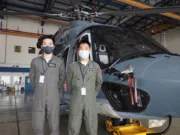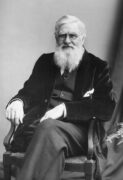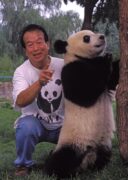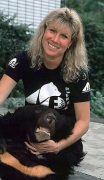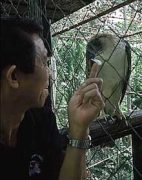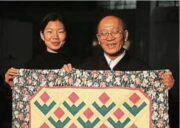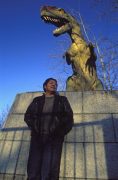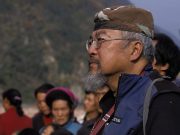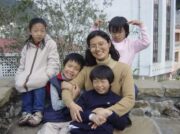The best way to get ahead, says this tireless Hong Kong philanthropist, is to help yourself.
A Brighter Tomorrow
Most students who attended Hong Kong City University’s diploma course in social work in the early 1990s were aged about 20. Among them sat a woman who had turned 40. She was as attentive as other students, but sometimes had her two young daughters with her. They would draw, do their homework or sleep.
Jessie Yu attended lectures five or six days a week. When there were no lessons, she worked as a helper for three households, returning home to put her daughters to bed and to study. It was tough work, and the money she earned barely covered her living expenses.
But Yu kept going because she had a clear vision. She longed for graduation when she would begin social work, earn more money and have more time for a hotline she had started to help other single parents.
For most of her marriage, it was a future Yu didn’t dare dream of. She lived with her husband, her illiterate mother and two daughters in a government flat in Hong Kong’s Sha Tin district. She learned to fear the sound of her husband returned home from work and would look at his face. If he was glowering, it was a signal he could explode for no reason.
Yu had learned the truth about her husband too late. Born in India, she traveled to Guangzhou, China, after her father died in 1967. Then she went to Hong Kong with her mother. Yu met her husband-to-be while in a function of the trade union. She married the apparently kind-hearted man, then discovered his other side. He dictated what Yu did – what clothes she wore, what she’d watch on television. He threatened to beat up relatives or friends if she didn’t obey him.
One night, when they were in bed, Yu mentioned her brother-in-law. Enraged, her husband abused her again. Yu lay still and reflected. Her mother had recently moved to a home for the aged, so she no longer had to worry about him mistreating her.
Escape
Once her husband had gone to sleep, Yu slipped out of bed and packed a few belongings in her daughters’ school bags. At six next morning she got up as usual and took the girls to school. That afternoon, they stayed in Harmony House, a sanctuary for victims of family violence. Hearing the iron gate of Harmony House banged shut, Yu thought, We’re safe at last.
Yu was free. But she had hazy notions of how she might find a happier life.
She soon began seeing clinical psychologist Catherine Tang, who urged Yu to think about how she could build herself a future. She also tried to ease Yu’s emotional trauma. Yu was afraid to look others in the eye, so Tang set her homework. She had to look two people in the eyes each day, then talk to hawkers and bargain with them.
“Is there anything you’ve wanted to do, but haven’t had a chance to do?” Tang asked once.
“Yes, I want to study,” replied Yu who had left school on leaving India. Encouraged by Tang, soon Yu took a distance-learning course and completed secondary school in two years. She began part-time work in a social services agency.
One day a television reporter contacted the agency for help with a story about single-parent families. “Ask Jessie,” the reporter was told, “she’s just divorced.”
Yu agreed to the interview. After the story had been aired, she heard conflicting opinions from people who’d seen the program. “You’re a single parent, so you’re not a good mother,” said one. But many single parents told Yu, “You should do something for us.”
Yu agreed there was need for action. She had met many single mothers in her everyday life, and had become increasingly aggrieved that they were treated like second-class citizens. “Why is it that when we approach schools for our children we would be told Ôsorry, full house’?” she asked. “Why when we apply for jobs do employers say we’re looking after our kids alone so will need time off? It’s because we’re single parents.”
With a few single mothers and social workers Yu decided to register a group that would run a hotline for single parents. Yu, who was by then studying at City University, registered the Concern Group on Single Parents (which has become the Hong Kong Single Parents Association since 1996).
Why should people help you?
On September 21, 1991, the group held an inauguration ceremony with reporters attending. When one asked, “Why should people help you and not the disabled or elderly?” Yu was hard-pressed for a complete answer. That night she thought, We must be prepared to meet the press, learn how to lobby, win people over.
Subsequent publicity ensured their hotline was busy from the beginning. Sometimes singly, sometimes two or three together, working in the evenings till midnight or later, Yu and her small band of volunteers manned the hotline.
Though Yu had little time to spare between university course work and her home-help jobs, she devoted as many evenings as she could to answering phones. “I know what you mean,” she often told callers to their surprise. “I’m a single parent too.” Sometimes callers cried as they unburdened themselves. Yu cried too. Many callers became members of the association.
Armed with information from phone calls and barbecues, as well as research in libraries, Yu began to lobby officials in the Government’s housing authority and education department for policy changes. She spoke to the press, more confidently now.
Thanks to one volunteer, the association had received a HK$30,000 grant soon after being inaugurated. After a year of operation, most of the money remained, and Yu decided they should switch to a rented room, in the Kwun Tong district as the then borrowed office could not be occupied for too many hours each day. Yet, the rented room did not even have a door.
In 1994, Maria Chung, chairperson of the Wai Yin Association – founded by former Miss Hong Kong contestants – phoned Yu to request a visit. Surprised, Yu said: “Oh, Miss Hong Kong, good.”
Members were excited that a celebrity was on the way, and crowded in and around the tiny office as Chung and six members from Wai Yin visited. Later the association decided to make the association a main beneficiary of a forthcoming New Year’s Eve Ball. Chung invited Yu to join them. Yu was thrilled. On the night of the ball, she gave a speech, then played a game on stage – tossing balls to two people who had to catch them with one hand. As they fumbled, Yu told the audience, “That’s what it’s like being a single parent family.”
That night, Chung presented Yu with a check for HK$300,000. Yu couldn’t believe her eyes. Back home, she showed her daughters the check. “Have you ever seen so large a number in your life?”
The association could now expand, hiring a part-time staff and moving to a place where a door is found. But the money wouldn’t cover more services for long. So Yu prepared funding proposals. Eventually the Keswick Foundation and Oxfam each agreed to donate some money to support the association. Upon the invitation of the Keswich Foundation, Yu became Chief Executive of the association.
In 1998, the association moved to its current base in Wai Yin Association Activity and Resource Centre in Tai Hang Tung. Here there are offices, an activity room for parents, a library and a room where kids can be kept happy. In autumn last year [2002], with the aid of the government, the association added a second facility – West Kowloon Single Parent Career Development – in a nearby building.
Volunteers still underpin the single-parent association’s success, and many in turn have benefited from their relationship with it. Tam Siu-hing, for example, joined as a volunteer in 1993, having first called the hotline for help after divorcing. Yu found Tam to be honest and trustworthy. In 1998, Tam was elected chairperson.
“After all these years in the association, my life is full of energy,” Tam says, her eyes shining. “Now, 24 hours in a day aren’t enough for me. My life is rich.”
Passion for helping people
Yu is likewise busy, occasionally to the point of working 24 hours straight. Apart from meeting newcomers to the association, she makes decisions, screens applicants for new staff (18 now work for the association), and attends meetings outside the center. She is a member of the Equal Opportunities Commission and the Social Welfare Advisory Committee. She has also been taking part in the work of the Committee on Home-School Cooperation.
Usually, Yu works late. When she arrives home, her younger daughter Janet – whose sister Joyce is studying Fine Art in Guangzhou – might bring her slippers and a glass of water. Then Yu switches on her computer to reply to the many emails that come in from government officials and single parents seeking help and information.
Though Yu makes relatively little time for seeing her daughters, she believes she’s achieved her goal of leading a good family life. “I have given my daughters the chance to live their own lives,” she says. “I tell them that the quality of time we’re together is more important than the amount.”
“I understand what mum’s doing,” says Janet. “I’m really proud of her.”
A key aspect of the association remains the hotline, for which Yu has written training manuals and run training courses. “Attitude is the most important thing for people answering hotlines,” says Yu. “We are not solving problems for them, we are enhancing their ability to tackle problems.”
Yu is evangelical about self-help, and passionately believes in the association’s core philosophy: strengthen ourselves, help ourselves, and help others. However, she appreciates that people may need a helping hand early on. Single parents who have recently arrived from mainland China, for instance, receive guidance on relatively simple aspects of Hong Kong life, such as using the MTR (subway). One mentally challenged woman couldn’t read or use the MTR or buses, so Yu guided her to the Labour Department and showed her how to use public transport. The woman found a job cleaning tables in a restaurant.
Sarah Ng is another whose life has been changed by Yu’s emphasis on self-help. Five years ago, Ng’s husband died of cancer, leaving her with a six-year-old daughter and five-year-old son, both of whom suffered serious hearing problems. Her husband had operated a restaurant, and she continued the business until, a year later, it burned down. Ng didn’t know what to do.
One evening, after helping her children with their homework, Ng turned on the television, and saw Jessie Yu talking about her own experiences bringing up two daughters. Ng watched intently. Later, she arranged a meeting.
“In the past, I was like you,” Yu said. “You can improve your financial situation. If you can’t help yourself, how can you help your daughter and son?”
Ng thought this was good advice, and set her own life goals with studying a key aim. With her children’s support, she began evening courses in English as well as self-study courses in math, science and computing. She’s now a clerk in a small company. “Jessie has enabled me to set a clear goal for myself and my family,” Ng says.
Yu’s thinking has influenced fellow social workers too. Kwok Wai-han admits that she once thought that the government and other social services should simply give to people in need. But Yu has changed her thinking. “You should have the courage to face your problems and not rely on government,” Kwok says.
More than 100 households are currently members of Yu’s organization – mostly with single mothers, though the association is assisting more and more single fathers.
In addition to helping people to build fresh lives, Yu is concerned about broader policies and changing those she considers wrong. In 1993, she began questioning the government about the tax allowance for single parents. It was around 30 to 40 percent of that for married couples with children. Hearing the Commissioner of the Inland Revenue Department on the one day, she phoned in, and asked him on air for an appointment.
“It’s like we’re being punished,” she told him. After sympathetic press reports on the meeting, the government made the allowance the same as for married parents. Yu was proud. The association had the power to change things.
Today Yu shares her experiences with organizations in Mainland China, Taiwan and Macau (west of Hong Kong) from time to time, and her self-help philosophy is approved of by a certain number of people, who are following suit to extend their help to single parent families.
“I particularly like Jessie,” Carrie Lam, Director of the Social Welfare Department in Hong Kong, says. “She has gone through single parenthood and associated difficulties, and this background makes her very effective. She also has a philosophy that’s much like mine, emphasizing self- reliance and self-esteem.”
[This article first appeared in the May 2003 Chinese edition of Reader’s Digest. Reader’s Digest holds copyright in the text.]
pdf file of this article as it appeared in the Digest‘s Chinese edition
Top People
Helicopter crews brave mighty winds and waves to rescue seamen during South China Sea typhoons
On the morning of 2 July 2022, as Hong Kong was lashed by gales and rainstorms…
James Reynolds typhoonhunter and volcano videographer
An Eye for the Storm As Super Typhoon Dujuan slammed into northeast Taiwan late on 28…
Maasai safari guide Jackson Looseyia
BAD-TASTE BLOOD My home village had about 15 people in it. What we think of as…
A Man for All Sequences Frederick Sanger
November 2013 saw the death of a man described by Craig Venter, among the pioneers of…
Blue light at last wins Nobel for LED titans
While the 2013 Nobel Prize in Physics was for an esoteric advance in knowledge — theoretical work…
Genius of the Jungles: Alfred Russel Wallace
Recently came news of a study finding that the distribution and evolution of Galapagos wildlife have…
The butterfly and the remarkable Professor Hofstadter
This spring, there was excitement in the world of physics as a long-predicted butterfly was proved…
James Hansen Godfather of Climate Change retires yet will be very busy
This month [April 2013], climate scientist Dr. James Hansen retired as head of NASA’s Goddard Institute…
Pan Wenshi: Scientist Who Fights for the Pandas
In a cave near a tributary of the Youshui River, Pan discovers Jiao Jiao, an eight-year-old,…
Jill Robinson helping bears
First Jill Robinson was shocked, then she set out to stop the suffering The Great Bear…
Keeper of the Kings: Captive breeding Philippine Eagles
One man’s perseverance offers hope to a critically endangered bird of prey On a warm, sunny…
Dr Yang Lihe helping former leprosy patients
Dr. Yang Li-he has spent his life helping cure leprosy. Now he is helping former patients…
Dinosaur hunter Dong Zhiming
Unearthing China’s Real Dragons Dong Zhiming, 26, walked atop a low cliff of red and yellow…
Dramatic rescue by brave helicopter crew from roof of blazing Garley Building in Kowloon
Captain Mike Ellis eased the Sikorsky Blackhawk in towards the beleaguered, 16-storey Garley Building, in the…
Mountain Dog and rebuilding schools in China
I’m at a charity ball in Hong Kong, seated among a hundred guests in a bright…
Mother Ko’s fight for justice
The more lawmakers ignored her, the more determined she became to seek justice On a grey,…
SARS doctor and heroine Yannie Soo
A mysterious illness was striking the medical staff down one by one. How could they fight…
Allen Lien
In October 2002, boxes of clothes began arriving in Burkina Faso, a country in West Africa,…
Teacher Lin helps kids in Taiwan
Teacher Lin has a dream, in which more and more needy children find their home sweet…

